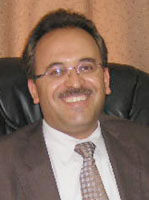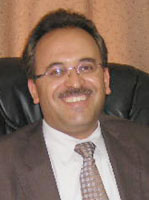
Minister of Local Administration to Yemen Times:”My aspiration is to create a local administrative system where the people’s needs come first” [Archives:2008/1152/Reportage]
May 5 2008
 |
Prior to his appointment as Minister of Local Administration, Abdul Qader Hilal was the governor of Hadramout for over six years, after being governor in Ibb for seven. He has been working in the government since his graduation from the Police Academy specialized in Law in 1986. His high diploma in local administration and affiliation with many civil society organizations has made him closer to the people and is remembered fondly.
Born in Sana'a in 1962, he was raised in a well-educated family that respects learning, as his father was a renowned religious scholar and man of knowledge. Abudul Qader Hilal is married and has nine children.
Today, Hilal's main challenge is to help governors overcome the difficulties they suffer because of the centralized political system and to ensure that Yemen's experience with gubernatorial elections is a positive one.
Nadia Al-Sakkaf, Editor in Chief of Yemen Times met with Hilal and spoke with him about decentralization and the importance of local governors.
How has your experience as a governor and as deputy governor before that influenced your decisions now that you are a minister based in Sana'a?
I am proud and honoured by the people's love in Hadramout and my experience in that governorate. I would like to emphasize here that it was a team effort and what we have accomplished in Hadramout is because of the support and encouraging environment created by the citizens of that governorate in the first place and of course with the support of the political leadership.
During my work now as a minister, I reflect all the time on how it was while I was a governor and try to create a system and procedures that would help facilitate the work of the governors around the republic. I work on empowering the governors and increasing decentralization and the authority local governors and administration councils have.
The gubernatorial elections are the application of a commitment in the presidential program, which I was entrusted to accomplish. There were several steps to leading to this phase such as the previous two local council terms. I hope that I will be able to accomplish this in a way that endorses democracy.
As for the responsibility of governors, I would like to advise each governor to respect the particularities of that governorate and to be humble and close to the people. Especially now that governors are to be elected, they should be closer to the people as they are considered a direct extension of the people's authority in the governorate.
These governors must realize that they are the first batch of elected governors and have an even larger responsibility to confirm the success of decentralization through this election process. I do think that a big part of the success of the governors' election process depends directly on the characters and the attitudes of the first batch of elected governors individually.
What do you read in the opposition boycott of the gubernatorial elections? Do you agree that this is a repetition of their mistake in the 1997 parliamentary elections?
There is a kind of egotism in the way the opposition is acting. They demanded that governors come from the governorates themselves, and when they got the chance they rejected the initiative and opted to boycott the whole process. They represent only 10 to 13 percent of the members of the local council, so their boycott will not really affect the election procedure in numbers.
There are some limitations in the legislation governing the election process, such as the requirement that the candidates should have at least 10 years experience in the government, the organized private sector or in international non-governmental organizations (NGOs). Why are people with experience in local NGOs and people with experience in the non-organized private sector excluded?
They are not excluded as such; in fact people with experience in the local NGOs are included by implication as part of the candidates with experience in the international NGOs. However, with regards to those in the non-organized private sector, you cannot expect a governor to be able to complete his or her duties properly if they were working previously in a farm or running a small grocery shop. There is a standard we should aspire to maintain.
How did you come up with this mechanism in the first place?
Well, we had been preparing since 2006 because the promise to have the governors elected was in the president's program and so we had to live up to the promise he gave the people. We also created three surveys whereby we polled the political activities, the academics and the civil society on the concept of electing the governors and the mechanism and we got a positive feedback.
I believe that one form of democracy is run by the elite, the people who have the knowledge and the ability to judge and participate effectively. They were the ones we consulted before we embarked on the procedure. I would like to again call on any person or body that has some input they believe would help our work endorsing a strong, decentralized democratic system to come forward.
Do you think that this initiative will help ease the social and political tension especially in the Southern governorates?
Yes, I do. I think that the governors being elected by the local council, which the people elected, means that the governors have some kind of legitimacy coming from the people themselves. In my opinion, the governor's role is very important, even more important than that of the minister, because he or she is in direct contact with the people and play a crucial role in conveying their concern to the authority and vice versa.
How do you plan to improve the governors' performance?
After the elections are over, we will have a three-day assembly where we provide the elected governors with tools and training to enable them to carry out their responsibilities. We will assist them in developing their program or action plan for the remainder of this year and for next year. Don't forget that it is a learning process and the public also has ownership in correcting and assisting the governors that they have indirectly chosen. So they could come to the local councils and demand something to be reformed or give their feedback to the council on the performance of the governor.
Here is where the opposition is mistaken in boycotting the elections: the governor will not be able to receive their input. Had the opposition in the local councils supported the process, the elected governor would feel obliged to these members regardless of their political affiliations. Now with this boycott, there could be a kind of uneasiness within the local councils and between the elected governor and the boycotting members of the local councils.
Where do women stand in the local administration system?
I believe women are very capable. We are moving towards a quota of 15 percent in the local councils. This could be described in one of two ways: one is to create a committee for women in the local council, or to have an open membership for women to create 15 percent of the local council which doesn't confine them. We are still discussing the options and we are involving civil society in this process and have agreed with Amal Al-Basha of the Sisters Arab Forum to gather the civil society and have input through recommending laws and legislations in the local councils' procedures to endorse women's participation. In my opinion, I think there is no other solution to endorse women's political participation other than the quota system.
What are the procedures you have created to ensure the elections would be fair and transparent?
We are committed to international standards regarding transparency and equal opportunity. We have created a manual to be used in the election process. This procedure manual concerns the process of the governor's elections as a whole. It includes forms and tables to be used in the various procedures and has a step-by-step instruction list to cover the elections in three phases: preparation and role of the supervisory committee, candidate application process and the actual day of election and voting process. The manual includes procedures for training of the personnel involved in the process as well as precautionary measures to ensure transparency and how to report fraud if something goes wrong.
As the Minister of Local Administration, what do you aspire to and what do you need to accomplish your aspirations?
My aspiration is to create a local administrative system where the people's needs come first. That all citizens are able to do their paperwork closer to their place of living, and feel that their local authority is able to fulfill their needs without having to go to the capital and endure the difficulties of a centralized system. I want citizens to feel that the money they pay for the services they get through the water, telephone or any other bills comes back to them in terms of better local services and facilities. I also hope that local citizens have a say in the future of their local administration and the regulations that affect their everyday life without fearing they will not be heard or worse, be victimized for standing up for themselves.
Isn't this a bit ambitious considering the current situation?
Not really. We don't give ourselves the credit we deserve. I can tell you many examples of in the rural areas of Hadramout where I was governor, where nomads went straight to the local council and said they did not like how a certain authority figure was behaving. They were able to get their voices heard and their demands met.
This brings me to the difficulties we face. One of them is the domination of a centralized culture even among the people, who believe that nothing can be done unless they travel to the capital city or have someone in the central government to attend to their needs. This is partially because of the long time the centralized system was in control, but things now are changing and we need the people to support the changes and embrace them.
Also the international organizations need to understand this and try to recreate their programs and strategies and not only focus on the central government. They need to think of the local administrations as partners and not just extensions of the central government.
The goal of my work is to create a local administration strategy that allows many of the stalling projects and budgets to move forward and development to be more spread out and not just contained in certain areas. We aim to support the governorates to be stand alone bodies that can make their own decisions within an overall country policy without needing to refer to the central government on every issue.
——
[archive-e:1152-v:18-y:2008-d:2008-05-05-p:report]


